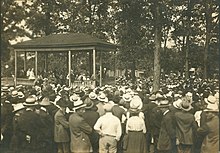Debs v. United States
He was arrested on June 30 under the Espionage Act of 1917 and convicted, sentenced to serve ten years in prison and to be disenfranchised for life.
The argument of the Federal Government was that Debs was attempting to arouse mutiny and treason by preventing the drafting of soldiers into the United States Army.
While he had tempered his speeches in an attempt to comply with the Espionage Act, the Court found he had shown the "intention and effect of obstructing the draft and recruitment for the war."
The speaker began by saying that he had just returned from a visit to the workhouse in the neighborhood where three of their most loyal comrades were paying the penalty for their devotion to the working class—these being Wagenknecht, Baker and Ruthenberg, who had been convicted of aiding and abetting another in failing to register for the draft.
He said that he had to be prudent and might not be able to say all that he thought, thus intimating to his hearers that they might infer that he meant more, but he did say that those persons were paying the penalty for standing erect and for seeking to pave the way to better conditions for all mankind.
He then expressed opposition to Prussian militarism in a way that naturally might have been thought to be intended to include the mode of proceeding in the United States.
The defendant next mentioned Rose Pastor Stokes, convicted of attempting to cause insubordination and refusal of duty in the military forces of the United States and obstructing the recruiting service.
He said that she went out to render her service to the cause in this day of crises, and they sent her to the penitentiary for ten years; that she had said no more than the speaker had said that afternoon; that if she was guilty so was he, and that he would not be cowardly enough to plead his innocence; but that her message that opened the eyes of the people must be suppressed, and so after a mock trial before a packed jury and a corporation tool on the bench, she was sent to the penitentiary for ten years.
There followed personal experiences and illustrations of the growth of Socialism, a glorification of minorities, and a prophecy of the success of the international Socialist crusade, with the interjection that 'you need to know that you are fit for something better than slavery and cannon fodder.'
The rest of the discourse had only the indirect though not necessarily ineffective bearing on the offences alleged that is to be found in the usual contrasts between capitalists and laboring men, sneers at the advice to cultivate war gardens, attribution to plutocrats of the high price of coal, &c., with the implication running through it all that the working men are not concerned in the war, and a final exhortation, 'Don't worry about the charge of treason to your masters; but be concerned about the treason that involves yourselves.'
The chief defences upon which the defendant seemed willing to rely were the denial that we have dealt with and that based upon the First Amendment to the Constitution, disposed of in Schenck v. United States, 249 U. S. 47, 39 Sup.
The most important question that remains is raised by the admission in evidence of the record of the conviction of Ruthenberg, Wagenknecht and Baker, Rose Pastor Stokes, and Kate Richards O'Hare.
There was introduced also an 'Anti-War Proclamation and Program' adopted at St. Louis in April, 1917, coupled with testimony that about an hour before his speech the defendant had stated that he approved of that platform in spirit and in substance.
This document contained the usual suggestion that capitalism was the cause of the war and that our entrance into it 'was instigated by the predatory capitalists in the United States.'
